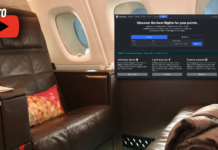With Air Canada Aeroplan, you can pay 5K points per passenger, per direction to add add a stopover to each direction of your trip. In this video, we’ll look at how to book an Air Canada Aeroplan stopover award, and will discuss some of what the rules are for Aeroplan stopovers.
How to book Air Canada Aeroplan stopover awards
(00:39) – What are the stopover rules for Air Canada Aeroplan?
(01:41) – How to find availability: Check the “Book with Aeroplan points” box and select “Multi-city / Stopover”
(02:36) – Add your stopover information with the “Add stopover for flight 1” link (instead of adding the details in the “flight 2” fields)
(03:19) – Click “Remove flight” to remove that “Flight 2” if you’re just booking a one-way flight with a stopover
(04:41) – Sort by Business class pricing (sorting low to high) to make sure you’ll see any Saver Awards that exist
(05:53) – When the notice “Mixed Cabin” is in red, it means less than half the itinerary will be in the class you’re looking at. (When the “Mixed Cabin” notice is in black, more than half the itinerary is in the class you’re looking at.)
(11:40) – If you want something a little more complex with lots of long layovers mixed in for example, use the “One Way” search instead of the stopover tool, (because the stopover tool only works for itineraries up to 4 segments, and more realistically, can only function well with about 3 segments.) With this option, you’ll need to find the flights yourself, then call to make the booking. Write down the flight number and the departure and arrival times so that you can give all of these details to the agent.
(23:15) – Us GCmap.com to help determine if your distances fit within the rule of not exceeding double the distance of the direct route
(26:30) – Make sure you’re not accidentally including any legs in a higher class than you’d like to pay for, because that will adopt that price tier for your whole itinerary. (Similarly, if you include a leg with Emirates, you’ll adopt the unique award chart used for Emirates awards, which may likely be more expensive.)
(28:29) – Open jaws aren’t allowed at your stopover point
Visit https://frequentmiler.com/subscribe/ to get updated on in-depth points and miles content like this, and don’t forget to like and follow us on social media.
Music Credit – “Ocean Deep” by Annie Yoder





Would a legal routing allow you to pass back THROUGH your departure airport on your way to your destination airport when continuing onward from your “stopover” airport?
For example, lets say I can find availability on individual segments from A (departure airport) to B (stopover airport), and also find availability from B to C (destination airport). But if the only available routing on the B-to-C legs has a connection (a layover, not a stopover) in A (your original departure airport), would that be allowable?
I suspect the answer is “no, because no backtracking allowed” but since I don’t recall seeing/hearing that rule called out specifically, figured I’d ask…
Thanks.
[…] I really liked this Frequent Miler video How to book Air Canada Aeroplan stopover awards. […]
For the route from Boston to Bangkok, about how much would be the total number of miles needed? How does Air Canada calculate the total amount of miles that they would charge?
At most, it would cost 115,000 miles one-way without a stopover or 120,000 miles with a stopover. The price depends on total distance flown.
Aeroplan has both a zone-based and distance-based award chart. You first need to figure out the zone of your departure (in this case Boston is in North America) and the zone of your destination (Bangkok is in the Pacific zone). Then there are distance bands, so you’ll need to add up the total distance flown and you’ll pay the price for that distance on the North America to Pacific chart. If you Google “Aeroplan award chart”, it’ll be easier to look at the chart than to follow the numbers here. Here’s a link also:
https://www.aircanada.com/content/dam/aircanada/loyalty-content/documents/flight-rewards-chart-en.pdf
As you’ll see in the “Between North America and Pacific zone” chart, a business class award itinerary where you fly 0 to 5,000 miles costs 55,000 miles in business class; flying between 5,001 and 7,500 total miles between those zones will cost you 75,000 miles in business class; flying 7,501 to 11,000 miles will cost you 87,500 miles in business class; flying 11,001 miles or more will cost you 115,000 miles in business class.
So then you use a tool like gcmap.com to measure the distance of all of the segments (just put in the airport codes like BOS-ZRH-IST-MCT-KUL-BKK or whatever it was — I can’t remember the exact segments I picked). The distance just from Boston to Bangkok (BOS-BKK) is 8,539 miles, so you can’t fly more than a total of 17,078 miles to get from Boston to Bangkok. Any routing over 11,001 miles costs the same 115K or 120K with a stopover, but if you fly few enough miles to be under that you’ll just pay according to the distance band. It doesn’t matter how many layovers you have, it just matters the distance flown.
Keep in mind that you can have a maximum of 6 segments in one direction (in other words, you can’t take more than six flights to get from Boston to Bangkok) and you can only have 1 stopover of more than 24 hours, But you could have 4 layovers of 23 hours each — I once flew a one-way award that took me 5+ days to get to the destination :-).
Thank you for this explanation – I get it now! Also just read your latest article on the subject. So clearly explained, with great examples and details.
Wouldn’t an ANA round the world ticket be better for this type of trip? You could stay longer at each location and have an open jaw. Miles needed should be similar but you would need to cross the pacific.
It depends. ANA passes on surcharges, which are substantial on Lufthansa group carriers (including SWISS, which I included in the post). I believe the YQ (carrier-imposed surcharges) on that Boston to Zurich leg are more than $1,000. That’s just the surcharge on that one leg. Yes, the ANA around the world chart can indeed be awesome if you’re able to find availability on airlines that don’t impose surcharges. Their RTW award chart is perhaps the best deal in international premium cabin award travel. However, ANA has several disadvantages:
By contrast, Aeroplan adds no surcharges, you can transfer to Aeroplan from Amex, Capital One, Chase, or Bilt, and those transfers are usually instant. And you can keep miles alive by transferring more in or earning/redeeming.
Again, that’s not to shoot down ANA as a bad deal. Again, it can be a phenomenal deal. Aeroplan is also a strong option for a lot of people.
When I tried to use aeroplan to book Turkish airline from US (ex. JFK) to Asia (ex. TPE) via IST (layover), I found business for these two segments. But if I tried to have stopover at IST, I just cannot find business class for the segment IST-Asia (ex. TPE). Is there any way to solve this issue? Thanks!
No. If they aren’t releasing that segment on its own to partners, there’s no way to make them do it.